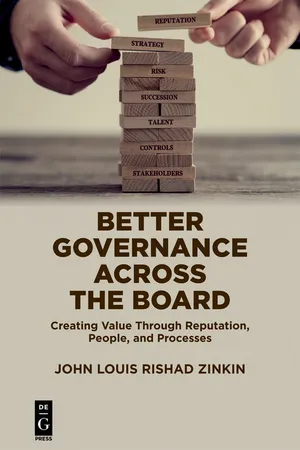What Is Corporate Governance?
Corporate governance (CG) is a relatively recent idea,i though the principles on which it is based are as old as humanity’s invention of organizations requiring people to come together to achieve a common purpose.
There are too many definitions of CG to do them all justice. The basis for this book is one I like for its completeness:
Corporate governance is defined as the process and structure used to direct and manage the business and affairs of the company towards promoting business prosperity and corporate accountability with the ultimate objective of realising long-term shareholder value while [considering] the interest of other stakeholders.
Corporate governance provides a framework of control mechanisms that support the company in achieving its goals, while preventing unwanted conflicts. The pillars of corporate governance such as ethical behaviour, accountability, transparency and sustainability are important to the governance of companies and stewardship of investors’ capital. Companies that embrace these principles are more likely to produce long-term value than those that are lacking in one or all.
Proper governance identifies the distribution of rights and responsibilities among different participants in the company and outlines among others the rules and procedures for decision-making, internal control and risk management. Corporate governance is not only concerned with shareholder interests but requires balancing the needs of other stakeholders such as employees, customers, suppliers, society and the communities in which the companies conduct their business.ii [Emphases mine]
This definition of CG widens the areas of responsibility and accountability of directors to include long-term outcomes and the needs of other stakeholders, going further than just focusing on the needs of shareholders. It reflects the transition from shareholder capitalism of the 1980s and 1990s to stakeholder capitalism in the twenty-first century. This progression can be seen when comparing earlier, narrower definitions of CG, which do not really take stakeholders into account and do not specify the importance of long-term outcomes, for example:
Governance is a system of rules, procedures and processes by which a company is directed and controlled. Specifically, it is framework by which various stakeholder interests are balanced and efficiently and professionally managed.iii
Corporate Governance involves a set of relationships between a company’s management, its board, its shareholders and other stakeholders. Corporate Governance also provides the structure through which the objectives of the company are set, and the means of attaining those objectives and monitoring performance are determined.iv
These earlier definitions were accepted worldwide and served their purpose well. After all, the Cadbury Committee Report was the foundation document for all CG; the Organization of Economic Cooperation and Development (OECD) Principles of CG were the reference document for regulators in IOSCO.v Limited reference was made to stakeholders, reflecting the twentieth century emphasis on shareholders. They also seemed to assume CG frameworks could be applied universally without too much difficulty. As jurisdictions began to take CG seriously, they discovered applying the principles of CG proved to be more challenging than expected. As a result, the OECD redefined CG in 2015, recognizing “one size does not fit all”:
Effective corporate governance requires a sound legal, regulatory and institutional framework that market participants can rely on when they establish their private contractual relations. This corporate governance framework typically comprises elements of legislation, regulation, self-regulatory arrangements, voluntary commitments and business practices that are the result of a country’s specific circumstances, history and tradition. The desirable mix between legislation, regulation, self-regulation, voluntary standards, etc., will therefore vary from country to country. The legislative and regulatory elements of the corporate governance framework can usefully be complemented by soft law elements based on the “comply or explain” principle such as corporate governance codes in order to allow for flexibility and address specificities of individual companies. What works well in one company, for one investor or a particular stakeholder may not necessarily be generally applicable to corporations, investors and stakeholders that operate in another context and under different circumstances.vi [Emphasis mine]
The 2008–2009 Global Financial Crisis highlighted the need to include ethics as an element of good CG and other failures raised questions about should be done about pension funds. I quite like this definition of CG, which recognizes the diversity of jurisdictions, articulates the need to consider ethics, long-term stakeholder expectations, and includes recognizing the rights of workers past, present, and future:
Different countries have different ideas as to what constitutes good corporate governance3. ... In essence we believe that good corporate governance consists of a system of structuring, operating and controlling a company such as to achieve the following:
–A culture based on a foundation of sound business ethics fulfilling the long-term strategic goal of the owners while taking into account the expectations of all the key stakeholders, and in particular:
- Consider and care for the interests of employees, past, present and future
- Work to maintain excellent relations with both customers and suppliers
- Take account of the needs of the environment and the local community
- Maintaining proper compliance with all the applicable legal and regulatory requirements under which the company is carrying out its activities. vii [Emphasis mine]

